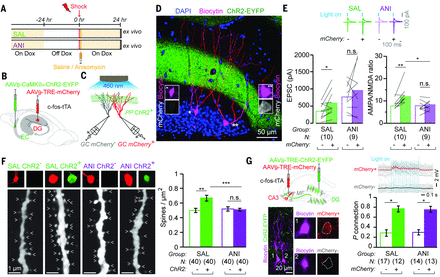Our official English website, www.x-mol.net, welcomes your
feedback! (Note: you will need to create a separate account there.)
Engram cells retain memory under retrograde amnesia
Science ( IF 44.7 ) Pub Date : 2015-05-28 , DOI: 10.1126/science.aaa5542 Tomás J Ryan 1 , Dheeraj S Roy 2 , Michele Pignatelli 2 , Autumn Arons 1 , Susumu Tonegawa 1
Science ( IF 44.7 ) Pub Date : 2015-05-28 , DOI: 10.1126/science.aaa5542 Tomás J Ryan 1 , Dheeraj S Roy 2 , Michele Pignatelli 2 , Autumn Arons 1 , Susumu Tonegawa 1
Affiliation

|
Experimental recovery from retrograde amnesia When memory researchers induce amnesia, they normally assume that the manipulations prevent the memory engram from effective encoding at consolidation. In accordance with this, Ryan et al. found that after the injection of protein synthesis inhibitors, animals could not retrieve a memory. However, to their surprise, the memory could nevertheless be reactivated by light-induced activation of the neurons tagged during conditioning. Increased synaptic strength that is the result of cellular consolidation is thus not a critical requisite for storing a memory. Science, this issue p. 1007 Memory can be retrieved by optogenetic activation of the neurons involved in memory formation when memories would not normally have been stored. Memory consolidation is the process by which a newly formed and unstable memory transforms into a stable long-term memory. It is unknown whether the process of memory consolidation occurs exclusively through the stabilization of memory engrams. By using learning-dependent cell labeling, we identified an increase of synaptic strength and dendritic spine density specifically in consolidated memory engram cells. Although these properties are lacking in engram cells under protein synthesis inhibitor–induced amnesia, direct optogenetic activation of these cells results in memory retrieval, and this correlates with retained engram cell–specific connectivity. We propose that a specific pattern of connectivity of engram cells may be crucial for memory information storage and that strengthened synapses in these cells critically contribute to the memory retrieval process.
中文翻译:

印迹细胞在逆行性遗忘下保留记忆
逆行性遗忘症的实验性恢复 当记忆研究人员诱发遗忘症时,他们通常认为这些操作会阻止记忆印迹在巩固时有效编码。据此,瑞安等人。研究发现,注射蛋白质合成抑制剂后,动物无法恢复记忆。然而,令他们惊讶的是,记忆仍然可以通过条件反射期间标记的神经元的光诱导激活来重新激活。因此,细胞巩固导致的突触强度增强并不是存储记忆的关键条件。科学,本期第 14 页。 1007 当记忆通常不会被存储时,可以通过参与记忆形成的神经元的光遗传学激活来检索记忆。记忆巩固是新形成的不稳定记忆转变为稳定的长期记忆的过程。目前尚不清楚记忆巩固过程是否仅通过记忆印迹的稳定而发生。通过使用学习依赖性细胞标记,我们发现突触强度和树突棘密度增加,特别是在巩固记忆印迹细胞中。尽管在蛋白质合成抑制剂诱导的失忆症下,印迹细胞缺乏这些特性,但这些细胞的直接光遗传学激活会导致记忆检索,这与保留的印迹细胞特异性连接相关。我们提出,印迹细胞的特定连接模式可能对于记忆信息存储至关重要,并且这些细胞中强化的突触对于记忆检索过程至关重要。
更新日期:2015-05-28
中文翻译:

印迹细胞在逆行性遗忘下保留记忆
逆行性遗忘症的实验性恢复 当记忆研究人员诱发遗忘症时,他们通常认为这些操作会阻止记忆印迹在巩固时有效编码。据此,瑞安等人。研究发现,注射蛋白质合成抑制剂后,动物无法恢复记忆。然而,令他们惊讶的是,记忆仍然可以通过条件反射期间标记的神经元的光诱导激活来重新激活。因此,细胞巩固导致的突触强度增强并不是存储记忆的关键条件。科学,本期第 14 页。 1007 当记忆通常不会被存储时,可以通过参与记忆形成的神经元的光遗传学激活来检索记忆。记忆巩固是新形成的不稳定记忆转变为稳定的长期记忆的过程。目前尚不清楚记忆巩固过程是否仅通过记忆印迹的稳定而发生。通过使用学习依赖性细胞标记,我们发现突触强度和树突棘密度增加,特别是在巩固记忆印迹细胞中。尽管在蛋白质合成抑制剂诱导的失忆症下,印迹细胞缺乏这些特性,但这些细胞的直接光遗传学激活会导致记忆检索,这与保留的印迹细胞特异性连接相关。我们提出,印迹细胞的特定连接模式可能对于记忆信息存储至关重要,并且这些细胞中强化的突触对于记忆检索过程至关重要。































 京公网安备 11010802027423号
京公网安备 11010802027423号